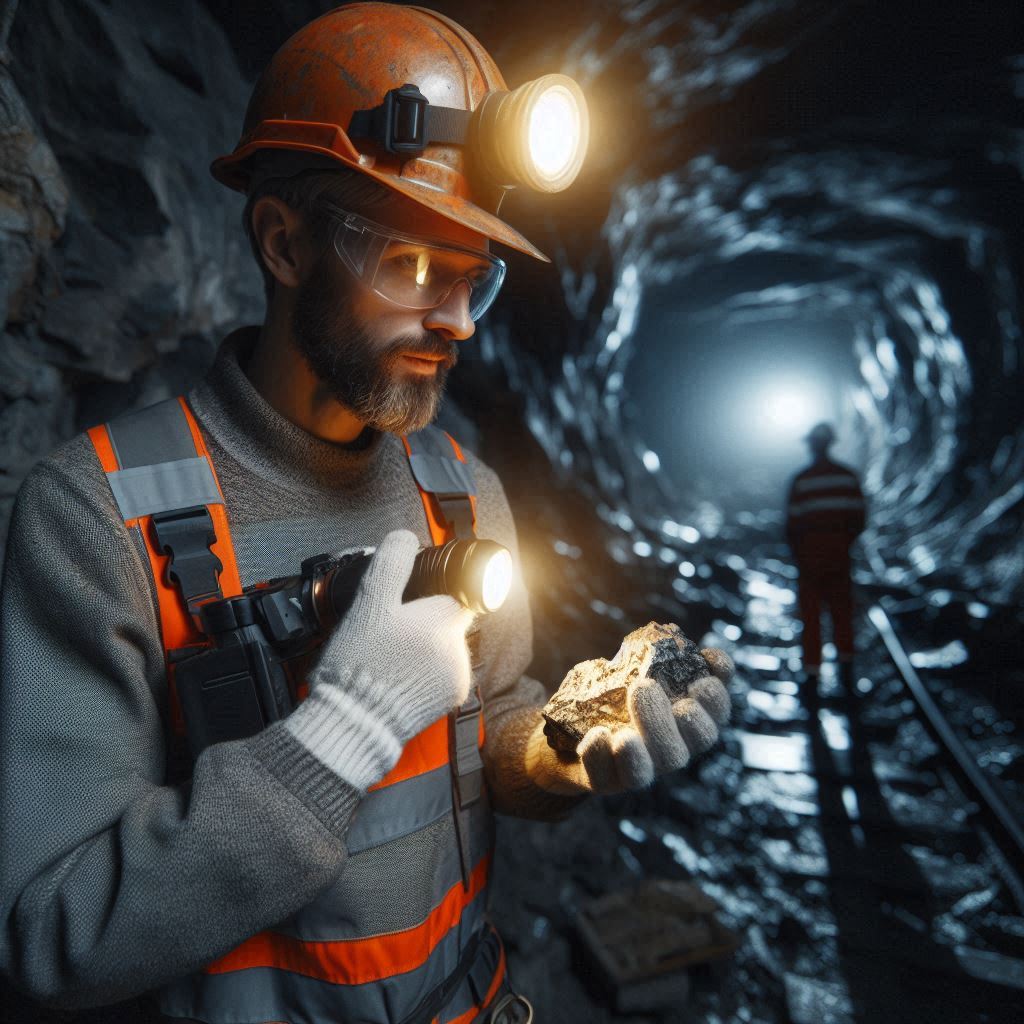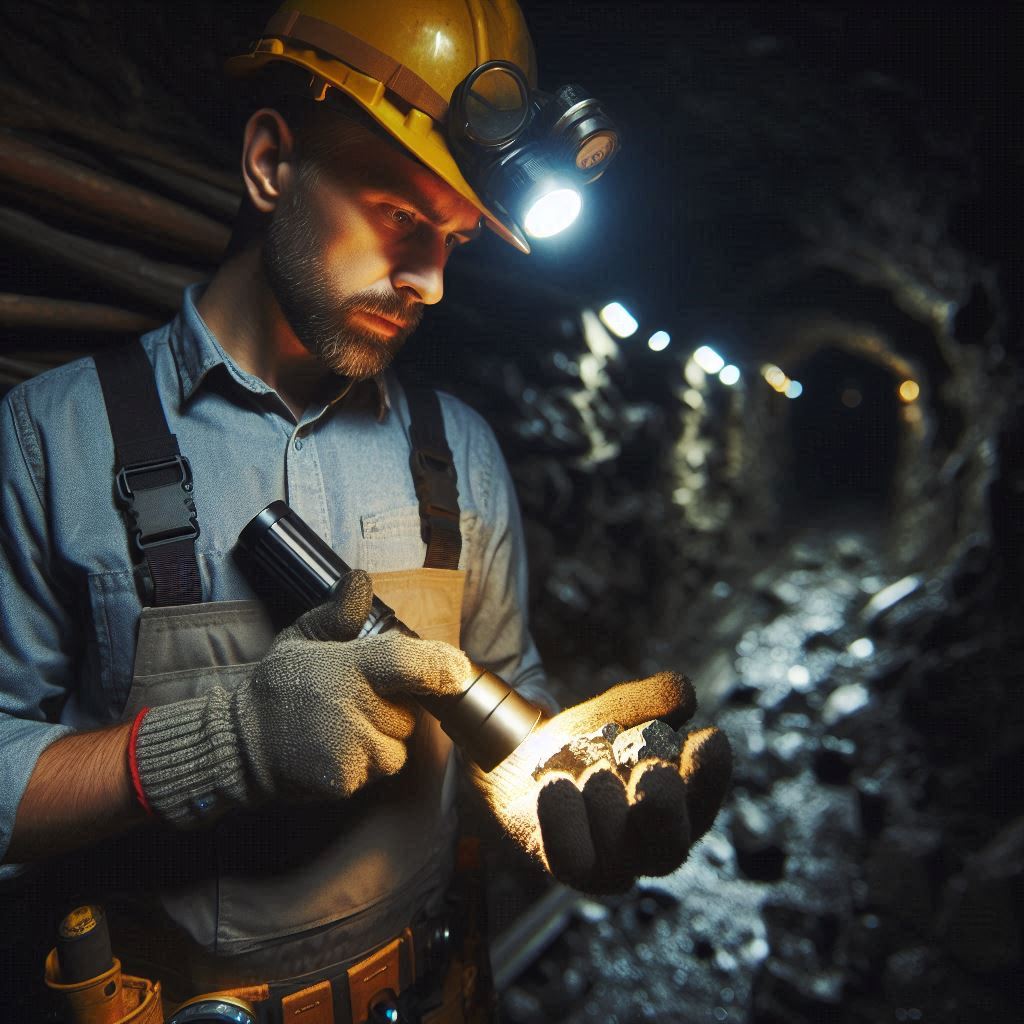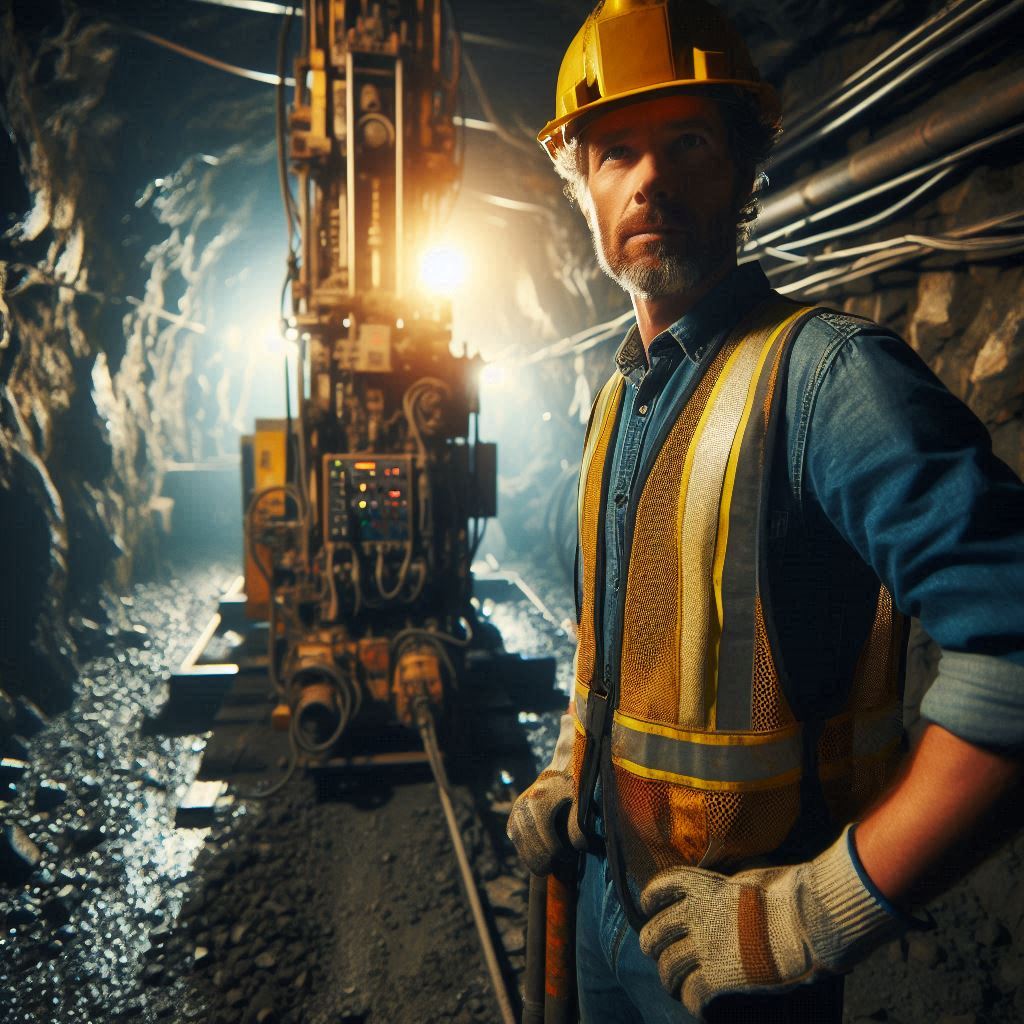Introduction
Certifications and licenses play a crucial role in the field of mining engineering.
They ensure that professionals meet industry standards and possess the necessary skills.
By obtaining these credentials, mining engineers demonstrate their commitment to safety, efficiency, and environmental responsibility.
Furthermore, certifications and licenses enhance career opportunities and credibility, making professionals more attractive to employers.
Brief Overview of the Importance of Certifications and Licenses in the Field of Mining Engineering
In the mining engineering field, certifications and licenses are essential for verifying a professional’s qualifications.
They signify a commitment to ongoing education and adherence to industry best practices.
This is particularly important in mining, where safety and environmental concerns are paramount.
Certifications ensure that engineers are well-versed in the latest technologies and methods.
Additionally, they often reflect a thorough understanding of regulatory requirements, which helps prevent legal issues.
Professional organizations such as the Society for Mining, Metallurgy & Exploration (SME) offer various certifications.
These credentials help engineers stay updated with industry advancements.
For instance, certifications can cover areas like mine safety, environmental management, and equipment maintenance.
By obtaining such certifications, engineers can demonstrate their expertise in specific areas.
This makes them valuable assets to employers and increases their chances of career advancement.
Explanation of How Certifications and Licenses Can Enhance Career Opportunities and Credibility
Certifications and licenses significantly enhance career opportunities for mining engineers.
Employers often prefer candidates who hold recognized certifications, as they indicate a higher level of expertise.
These credentials can lead to better job prospects and higher salaries.
Additionally, certified professionals are more likely to be considered for leadership roles.
This is because they have proven their ability to meet industry standards and maintain high levels of competency.
Licenses, such as the Professional Engineer (PE) license, further bolster an engineer’s credibility.
Obtaining a PE license involves passing rigorous exams and gaining relevant work experience.
This process ensures that licensed engineers possess both theoretical knowledge and practical skills.
As a result, PE-licensed engineers often have more opportunities for career growth.
They can take on greater responsibilities, including overseeing projects and managing teams.
Moreover, certifications and licenses provide a competitive edge in the job market.
In a field as specialized as mining engineering, standing out is crucial.
These credentials demonstrate a commitment to professional development and a willingness to go above and beyond.
This can be particularly advantageous in a competitive job market.
Engineers with certifications and licenses are seen as more reliable and capable, making them preferred candidates for top positions.
Overall, certifications and licenses are vital for mining engineers.
They not only ensure compliance with industry standards but also open up numerous career opportunities.
By investing in these credentials, mining engineers can enhance their professional standing and achieve long-term success.
The benefits of certifications and licenses extend beyond immediate job prospects, contributing to sustained career growth and development in the dynamic field of mining engineering.
Mining Engineering Certifications
Different types of certifications available for mining engineers
- Professional Engineer (PE) Certification: This certification signifies expertise in the field of mining engineering and allows engineers to practice independently.
- Mine Safety and Health Administration (MSHA) Certification: This certification is required for working in mining operations to ensure safety compliance.
- Certified Mine Safety Professional (CMSP) Certification: Demonstrates knowledge and skill in mine safety management and promotes best practices in the industry.
Benefits of obtaining certifications in terms of skill development and industry recognition
- Enhanced Skillset: Certifications validate specialized knowledge and skills, making engineers more competitive in the job market.
- Industry Recognition: Certifications establish credibility and demonstrate commitment to upholding industry standards and best practices.
- Career Advancement: Certification can open doors to new opportunities, higher pay, and leadership roles within the mining industry.
Overview of popular certifications in the field of mining engineering
- SME Registered Member Certification: Offered by the Society for Mining, Metallurgy & Exploration, this certification demonstrates professional competence in mining engineering.
- Mine Rescue Certification: Provides training in emergency preparedness and response, critical skills for mining engineers working in hazardous environments.
- Certified Mine Safety Manager (NIOSH): Focuses on advanced safety management strategies for mining operations, ensuring compliance with regulations and standards.
Read: Biomedical Engineer: Working in Healthcare Tech
Licensing Requirements for Mining Engineers
Explanation of Why Licensing is Necessary for Practicing Mining Engineering
Licensing for mining engineers is essential to ensure public safety and environmental protection.
Mining activities involve complex operations, requiring engineers to have a thorough understanding of geological formations, mining methods, and safety protocols.
Licensed engineers demonstrate their competence and adherence to industry standards, minimizing risks of accidents and environmental damage.
By obtaining a license, engineers show their commitment to professional ethics and continued education, fostering trust with employers, clients, and regulatory bodies.
Licensing also helps in standardizing the profession, ensuring that only qualified individuals are responsible for critical mining operations.
Different Licensing Requirements Based on Location and Type of Work
Licensing requirements for mining engineers vary significantly depending on the location and type of work.
In the United States, engineers typically need to pass the Fundamentals of Engineering (FE) exam, gain relevant work experience, and then pass the Principles and Practice of Engineering (PE) exam.
Some states may have additional requirements or specific regulations for mining engineers.
In other countries, licensing processes might differ, often involving national or regional examinations and mandatory registration with professional engineering bodies.
Engineers working in specialized areas, such as underground mining or environmental management, may need additional certifications to meet specific industry standards and regulatory requirements.
Importance of Staying Up-to-Date with Licensing Requirements and Regulations
Staying up-to-date with licensing requirements and regulations is crucial for mining engineers to maintain their professional status and ensure compliance with evolving industry standards.
Regulations and best practices in mining engineering continuously evolve due to technological advancements, environmental considerations, and safety improvements.
Regularly renewing licenses and attending continuing education programs help engineers stay informed about new developments and regulatory changes.
Engineers must also be aware of any changes in licensing procedures or requirements in their jurisdiction, as failing to comply can lead to penalties or loss of licensure.
By keeping their knowledge current, mining engineers can effectively manage projects, adhere to safety standards, and contribute to sustainable mining practices.
Read: Biomedical Engineering: Industry Outlook 2024
Steps to Obtain Mining Engineering Certifications
Mining engineering certifications validate your expertise and enhance your career prospects.
Here is a detailed guide on obtaining these certifications, tips for exam preparation, and resources to aid your study.
The Process of Obtaining Certifications in Mining Engineering
Obtaining mining engineering certifications involves several steps.
First, earn a bachelor’s degree in mining engineering or a related field.
Accredited programs ensure you meet the educational requirements set by certifying bodies.
Next, gain relevant work experience under the supervision of a licensed engineer.
This practical experience is crucial for understanding real-world applications of mining engineering principles.
After gaining sufficient experience, apply for the Fundamentals of Engineering (FE) exam, administered by the National Council of Examiners for Engineering and Surveying (NCEES).
Passing the FE exam designates you as an Engineer in Training (EIT) or Engineering Intern (EI).
Subsequently, accumulate more work experience, typically four years, before applying for the Principles and Practice of Engineering (PE) exam in mining engineering.
Passing the PE exam grants you a Professional Engineer (PE) license, a significant credential in the field.
Tips for Preparing for Certification Exams and Requirements
Preparation is key to passing mining engineering certification exams.
Start by reviewing the exam specifications provided by NCEES.
Understand the format, topics covered, and the type of questions you will face.
Create a study schedule that allows ample time to cover all topics thoroughly.
Utilize study guides and review books specifically designed for the FE and PE exams.
These resources provide practice questions and detailed explanations of key concepts.
Joining a study group can also be beneficial.
Collaborating with peers allows you to discuss complex topics and gain different perspectives.
Additionally, attending review courses, either in-person or online, can provide structured learning and expert guidance.
Ensure you meet all eligibility requirements before applying for the exams.
This includes having the necessary education and work experience and completing any required documentation.
Resources Available for Studying and Preparing for Certifications
Numerous resources are available to help you prepare for mining engineering certifications.
NCEES offers official study materials, including exam specifications, sample questions, and practice exams.
These materials give you a clear understanding of what to expect on the test day.
Additionally, various professional organizations, such as the Society for Mining, Metallurgy, and Exploration (SME), provide study guides, reference books, and online courses.
Online platforms like Coursera and Khan Academy offer courses on relevant subjects like geology, mineral processing, and engineering principles.
These courses can supplement your study materials and provide a deeper understanding of key topics.
Libraries and bookstores also stock a wide range of reference books and exam preparation guides.
Make use of these resources to broaden your knowledge and reinforce your understanding of essential concepts.
Lastly, don’t overlook the importance of practical experience.
Working on real-world projects and tasks under the supervision of licensed engineers will provide invaluable insights and prepare you for the practical aspects of the certification exams.
Combining theoretical knowledge with practical experience is the best way to ensure success in obtaining mining engineering certifications.
Read: Biomedical Engineering: Research and Development

Benefits of Mining Engineering Certifications and Licenses
Advantages of having certifications and licenses as a mining engineer
- Credibility: Certifications and licenses demonstrate expertise and proficiency in mining engineering.
- Competitive Edge: Having certifications sets you apart from non-certified professionals in the industry.
- Industry Recognition: Certifications are recognized by mining companies and can open doors to job opportunities.
- Professional Growth: Continuous learning and certification maintenance help in staying updated with industry trends.
How certifications can enhance job prospects and career advancement
- Job Opportunities: Many mining companies prefer candidates with certifications for various roles.
- Career Advancement: Certifications provide a pathway to higher-level positions within the mining industry.
- Skill Enhancement: Certification programs often include training that can improve technical skills and knowledge.
- Networking: Certification programs offer opportunities to connect with other professionals in the field, leading to potential job referrals.
Impact of certifications on salary and earning potential in the mining industry
- Higher Earning Potential: Certified mining engineers tend to earn higher salaries than their non-certified counterparts.
- Salary Negotiation: Having certifications can give you leverage during salary negotiations with employers.
- Career Growth: Certification is often a prerequisite for promotions and salary increases within the mining industry.
- Recognition of Expertise: Certified professionals are perceived as more knowledgeable and competent, leading to better pay opportunities.
In essence, obtaining mining engineering certifications and licenses can have a significant positive impact on your career in the industry.
From credibility and competitive edge to enhanced job prospects and higher earning potential, certifications play a vital role in the professional growth of a mining engineer.
Investing in certifications is an investment in your future success in the mining industry.
Read: How Agricultural Engineers Improve Crop Yields
You Might Also Like: Top Software Tools Every Drafter Should Master
Continuing Education and Renewal of Certifications
Importance of Continuing Education for Maintaining Certifications and Licenses
Continuing education is crucial for mining engineers to maintain their certifications and licenses.
The mining industry constantly evolves, with new technologies and regulations emerging regularly.
Staying updated through continuing education ensures engineers remain competent and compliant.
Without ongoing education, mining engineers risk falling behind in their knowledge and skills, which can lead to safety hazards and non-compliance with regulations.
Employers and regulatory bodies value professionals who prioritize lifelong learning, making continuing education essential for career advancement and job security.
By engaging in continuous learning, mining engineers demonstrate their commitment to maintaining high standards in their field.
Strategies for Keeping Certifications Current and Relevant
Several strategies help mining engineers keep their certifications current and relevant.
First, they should regularly attend workshops, seminars, and conferences.
These events provide insights into the latest industry trends, technologies, and best practices.
Networking with peers and experts at these events can also lead to valuable professional relationships and opportunities.
Online courses and webinars offer flexible options for continuing education, allowing engineers to learn at their own pace.
Participating in professional organizations, such as the Society for Mining, Metallurgy, and Exploration (SME), provides access to resources, training programs, and certification renewal information.
Additionally, subscribing to industry journals and publications helps engineers stay informed about advancements in their field.
Overview of Renewal Process for Certifications and Licenses in Mining Engineering
The renewal process for certifications and licenses in mining engineering varies by region and certifying body.
Generally, engineers must complete a specified number of continuing education hours within a set timeframe.
These hours often include attending courses, seminars, and workshops related to mining engineering.
Engineers may also need to pass exams or assessments to demonstrate their updated knowledge and skills.
Some certifying bodies require documentation of completed continuing education activities, such as certificates of attendance or transcripts.
It’s essential for mining engineers to stay informed about the specific renewal requirements of their certifying body.
Regularly reviewing these requirements ensures that engineers can plan and complete the necessary activities on time.
Failure to renew certifications and licenses can result in penalties, including the inability to practice legally.
Therefore, maintaining an organized schedule and setting reminders for renewal deadlines are practical steps to ensure compliance.
In summary, continuing education is vital for mining engineers to maintain their certifications and licenses.
By employing strategies such as attending events, participating in professional organizations, and staying informed through industry publications, engineers can keep their certifications current and relevant.
Understanding and adhering to the renewal process ensures they remain compliant and able to practice legally.
Prioritizing continuing education not only enhances professional competence but also demonstrates a commitment to excellence in the dynamic field of mining engineering.
You Might Also Like: How to Balance Work and Life as a Biomedical Technician
Transform Your Career Today
Unlock a personalized career strategy that drives real results. Get tailored advice and a roadmap designed just for you.
Start NowIndustry Recognized Mining Engineering Certifications
In the mining industry, having the right certifications can make a significant difference in your career.
Employers often look for candidates who have obtained industry recognized certifications to ensure they have the necessary skills and knowledge to excel in the field.
Top Certifications Preferred by Employers in the Mining Industry
- Professional Engineer (PE) Certification: This certification is highly regarded in the mining industry as it demonstrates your competency and expertise in the field.
- Registered Professional Engineer (RPE) Certification: Another key certification that employers look for, showcasing your ability to practice engineering in a professional manner.
- Mining Engineer Certification: Specifically focused on mining engineering, this certification proves your specialized knowledge in the industry.
- Project Management Professional (PMP) Certification: Valued for mining engineers involved in project management roles, highlighting your skills in planning, executing, and overseeing projects.
- Environmental Engineer Certification: With a growing emphasis on sustainability and environmental stewardship in the mining industry, this certification can set you apart.
Employers value candidates who have taken the time to earn these certifications, as they demonstrate a commitment to professionalism and continuous learning.
Importance of Choosing Reputable and Recognized Certifications for Career Growth
- Employability: Having reputable certifications on your resume can significantly increase your chances of landing the job you want in the mining industry.
- Career Advancement: Recognized certifications can open up opportunities for promotions and career advancement within your organization.
- Credibility: Employers and clients are more likely to trust your skills and expertise if you hold certifications from well-known and reputable organizations.
- Networking: Certification programs often provide opportunities to network with industry professionals, expanding your contacts and opening doors to new career possibilities.
Choosing recognized certifications ensures that your investment of time and resources will pay off in terms of career growth and professional development.
Comparison of Benefits Between Different Industry Recognized Certifications
Each industry recognized certification offers unique benefits that can enhance your career in mining engineering. Here is a comparison of the benefits of some of the top certifications:
- PE Certification: Provides a broad recognition of your engineering expertise and allows you to work as a consulting engineer.
- RPE Certification: Focuses on professional ethics and standards, ensuring you adhere to the highest level of integrity in your work.
- Mining Engineer Certification: Specializes in mining engineering principles, preparing you for specialized roles in the industry.
- PMP Certification: Equips you with project management skills that are essential for overseeing complex mining projects.
- Environmental Engineer Certification: Demonstrates your commitment to sustainable practices in mining operations, an increasingly important aspect of the industry.
By carefully considering the benefits of each certification, you can choose the ones that best align with your career goals and aspirations in the mining engineering field.
Gain More Insights: Internships and Entry-Level Jobs for CAD Technicians
Conclusion
Recap of the Importance of Mining Engineering Certifications and Licenses
Mining engineering certifications and licenses are essential for career success.
These credentials validate an engineer’s knowledge, skills, and expertise in the field.
They ensure that professionals meet industry standards and can handle the complexities of mining operations.
Certifications and licenses also enhance credibility, making engineers more attractive to employers.
In a competitive job market, having the right credentials can set candidates apart from their peers.
Furthermore, they demonstrate a commitment to professional development and continuous learning, which is crucial in an ever-evolving industry.
Encouragement for Mining Engineers to Pursue Certifications and Licenses for Professional Development
Mining engineers should actively seek certifications and licenses to advance their careers.
These credentials offer numerous benefits, including higher earning potential and greater job security.
They provide opportunities for specialization, allowing engineers to focus on specific areas of interest within mining engineering.
Pursuing certifications also keeps engineers updated with the latest industry trends, technologies, and best practices.
Continuous learning through certification programs can lead to innovative solutions and improved mining processes.
By obtaining these credentials, engineers can take on more significant responsibilities and leadership roles within their organizations.
Role of Certifications in Shaping a Successful Career in Mining Engineering
Certifications play a vital role in shaping a successful mining engineering career.
They bridge the gap between academic knowledge and practical experience, ensuring engineers are well-equipped to handle real-world challenges.
These credentials reflect an engineer’s dedication to their profession and their readiness to meet industry demands.
In addition to technical skills, certifications often emphasize safety, environmental stewardship, and ethical practices, which are critical in the mining industry.
Ultimately, investing in certifications and licenses fosters professional growth and opens doors to new career opportunities.
Mining engineers who pursue these credentials are better positioned for long-term success and leadership in the field.




